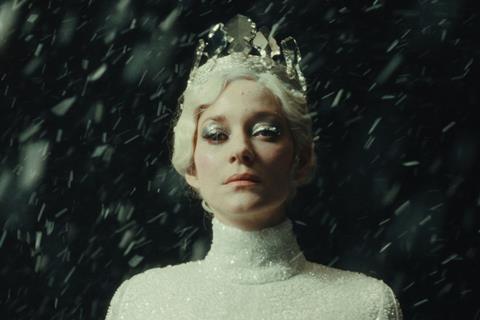Poised drama plays in Berlin’s Competition

Dir: Lucile Hadzihalilovic. Fr/Ger. 2025. 118mins
Countless adaptations and appropriations – among them Disney’s Frozen – have diluted the sheer weirdness of Hans Christian Andersen’s fairy tale The Snow Queen, a tale of good and evil that is also one young girl’s investigative quest for a missing boyfriend who has come under the influence of an older woman. In her ravishingly shot fourth feature, set in the mid 1970s, Lucile Hadzihalilovic takes the boy out of the picture. Told through the allusive frame of a female teenage runaways’s encounter with a movie star diva played by Marion Cotillard, who is shooting a new version of The Snow Queen, this is a story of womanhood at a crossroads: its two characters somehow become one, a before and an after, slowly circling, testing, and taking stock of one another.
A story of womanhood at a crossroads
Since Hadzihalilovic and Cotillard first teamed up in the director’s revelatory first feature, Innocence, in 2004, the actress has found global stardom while the filmmaker has ploughed her own idiosyncratic route in two other fantasy-tinged dramatic features; Evolution (2015) and Earwig (2021). Hadzihalilovic is a director who refuses to compromise her very distinctive vision and that is the case here, even if The Ice Tower, which bows in Berlin Competition, is her biggest film to date; utterly beautiful in every frame with a breakout lead performance by young French actress Clara Pacini.
To call The Ice Tower ‘conventional’ would be something of a stretch, but there is none of the wanton oddness of, say, Earwig. There a girl had actual teeth of ice; here, the icy heart of Cotillard’s jaded, damaged movie star Cristina is more metaphorical. With its long, dusty, amplified silences that sound like the run-out groove of a vinyl record, its glacial atmosphere, theme and pacing, The Ice Tower is, paradoxically, both Hadzihalilovic’s first stab at breaking out into mainstream exhibition berths and not an entirely easy sell. Festive season counter-programming offers one way out of the impasse.
With eyes like dark pools and the poise of a ballerina (a poster we glimpse for Powell and Pressburger’s The Red Shoes nods at an influence here), Pacini’s Jeanne is clearly the misfit in the poor mountain family whose rustic dining table she awkwardly joins near the start of the action. Soon enough she’s run away over snowed-in Alpine passes, missed only by a much younger sister with whom she shares a love of Andersen’s celebrated fable. Jeanne takes with her only a handful of agate beads that are, as any fairy tale fan will know, useful currency when on a quest.
Her destination, after a near assault while hitch-hiking, is a nearby town (actually Bolzano, in Italy’s Sud Tirol region), where, tired and hungry, she eventually finds a sleep space in what appears to be a semi-abandoned building. Soon enough, Jeanne will discover that she has slipped into the behind-the-scenes interstices of a film set. And the film, starring Cotillard’s difficult, imperious diva, is The Snow Queen.
Initially seen through slits in the backdrop, this film in the making is forbidden territory that Jeanne gradually slips into, in ways that require a certain magical-realist suspension of disbelief. She finds work first as an extra and then as the stand-in for the young Gerda of Andersen’s story, played by a tearful actress upon whom Cristina has placed a curse via a bady-wrangled (and later badly-mangled) crow. August Diehl turns up as Max, a caddish, melancholy old friend of Cristina’s who introduces himself to Jeanne as her doctor – a grown-up way of saying ‘pusher’. The director’s partner Gaspar Noe plays Dino, the briefly-glimpsed director of the film-within-a-film, that we struggle to situate in The Ice Tower’s 1970s setting based on what we see here – in all honesty it looks more Lucile Hadzihalilovic than, say, Dario Argento.
Jeanne is something of a magpie – she steals a many-faceted crystal drop from the Snow Queen’s dress, and even assumes the name, Bianca, of a woman whose handbag she finds on the streets of this cold, rationalist town, with its streets and piazzas straight out of a Giorgio De Chirico painting. Much of her rapport with Cristina, whose spell she gradually falls under, is made up of silent glances. Every word said – as when Jeanne, in Cristina’s dressing room, narrates a trauma involving her birth mother – is a risk.
With her steely, judgmental eyes, Cristina seems a monster forged out of the terrors and self-consciousness of adolescence – a transitional age that is Hadzihalilovic’s abiding theme. The shape-shifting refractions of this time of life are given visual form here in a series of dreamy ice-crystal montages set to the music of French composer Olivier Messiaen.
Production companies: 3B Productions
International sales: Goodfellas sales@goodfellas.film
Producer: Muriel Merlin
Screenplay: Lucile Hadzihalilovic, Geoff Cox
Cinematography: Jonathan Ricquebourg
Production design: Julia Irribarria
Editing: Nassim Gordji Tehrani
Main cast: Marion Cotillard, Clara Pacini, August Diehl, Gaspar Noe, Marine Gesbert
























